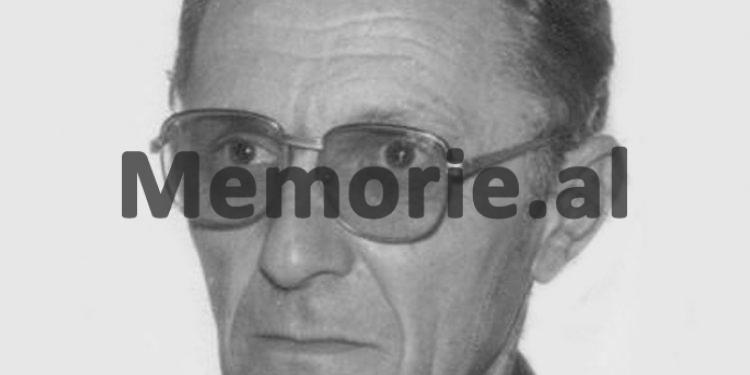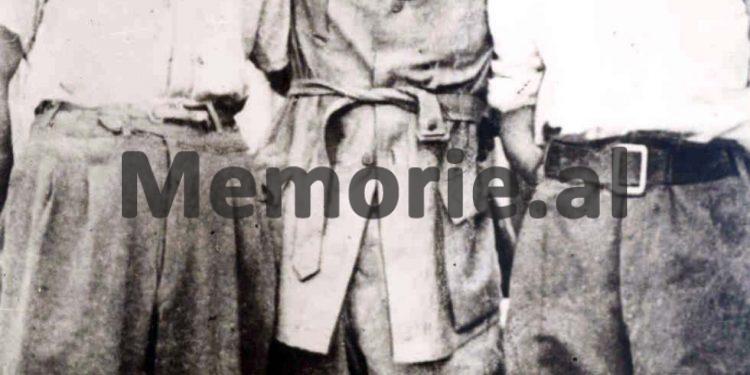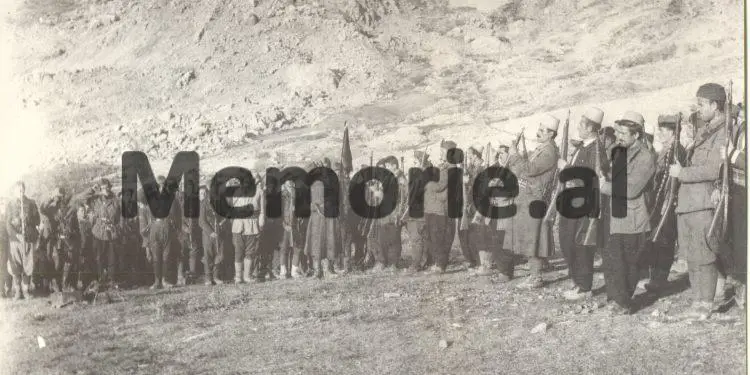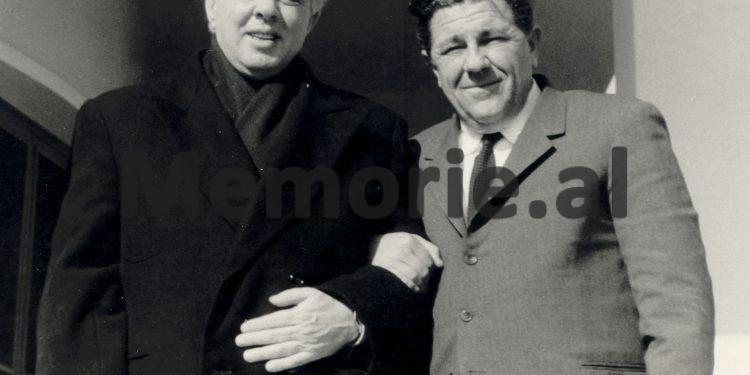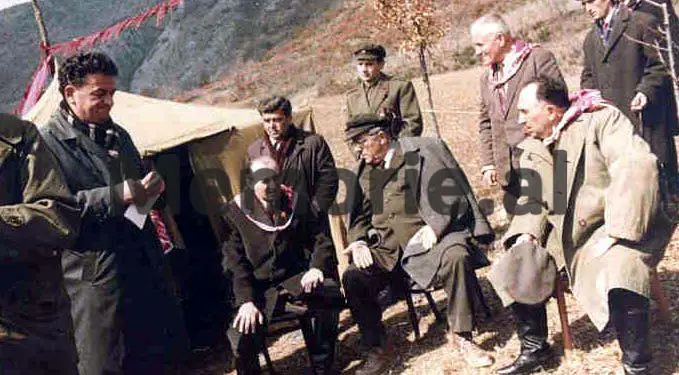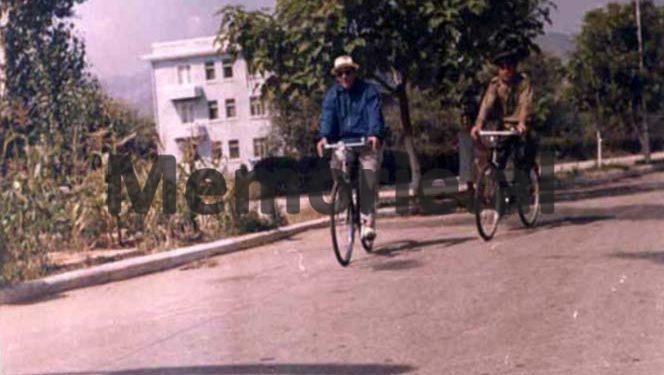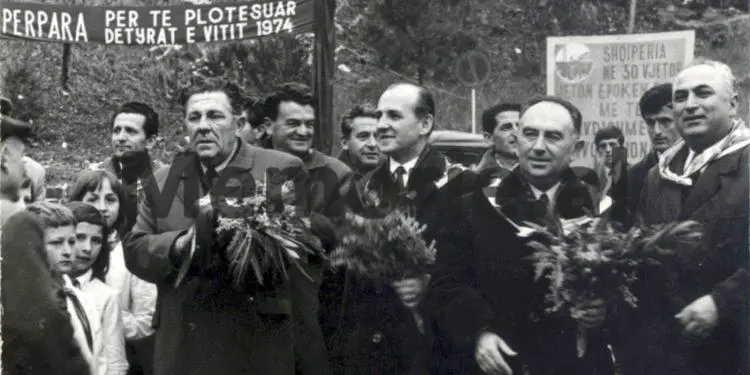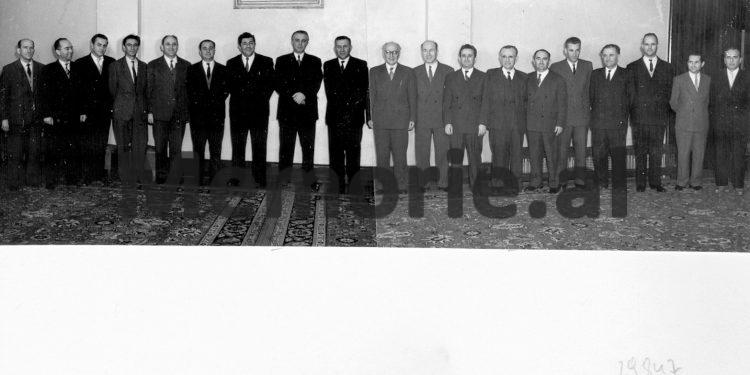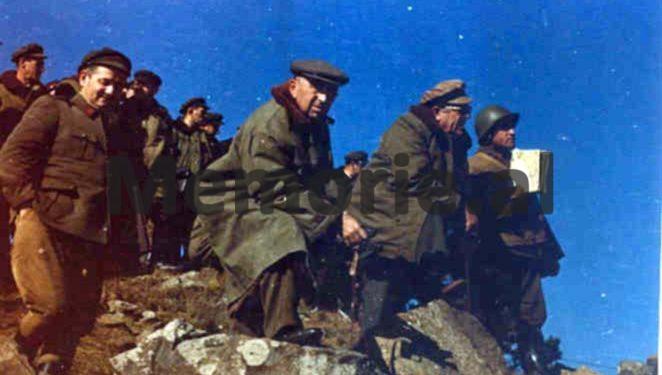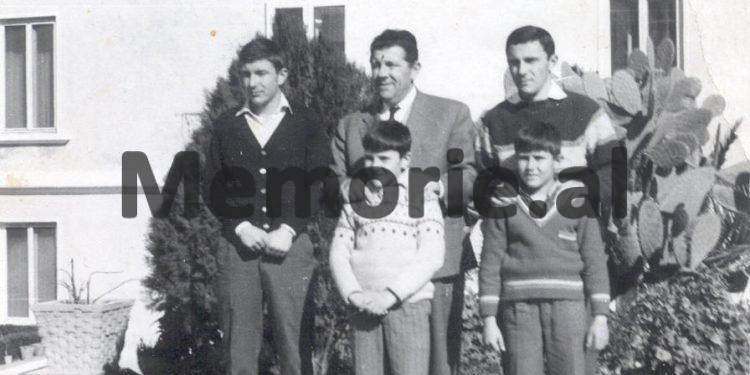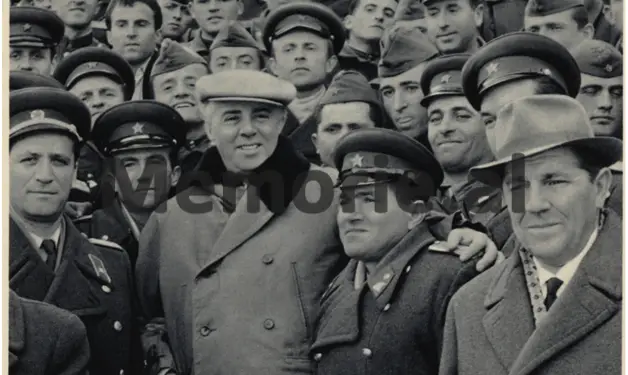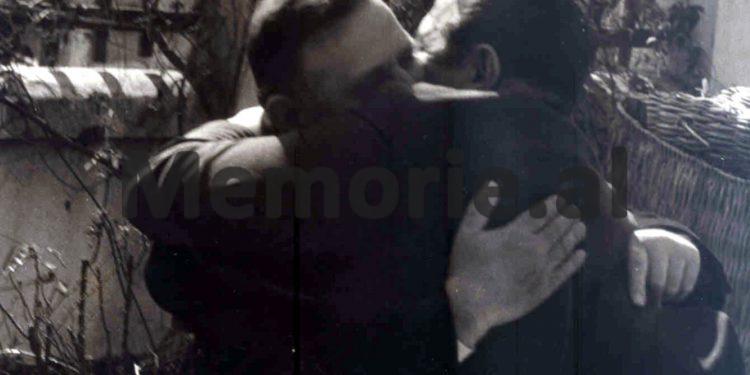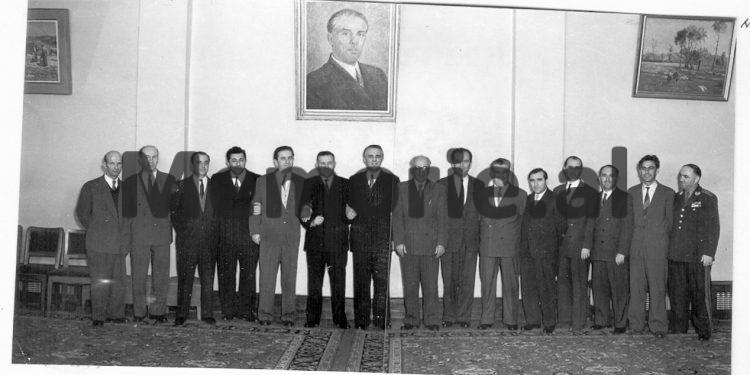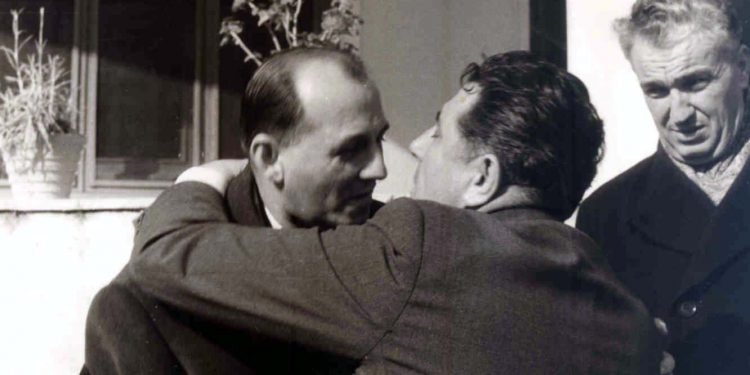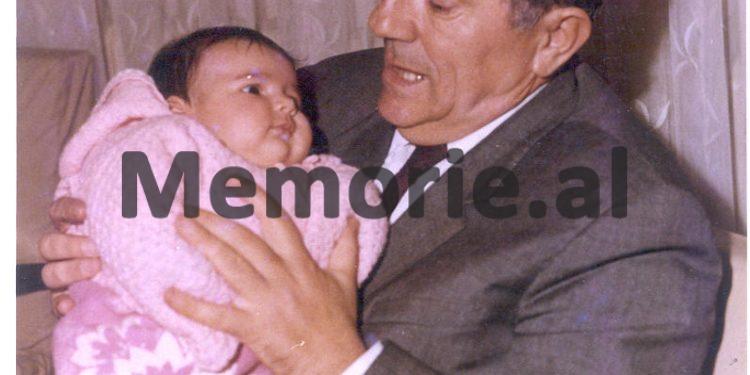Dashnor Kaloçi
Memorie.al publishes the unknown story of Beqir Balluku, former Minister of People’s Defense, member of the People’s Assembly, member of the Political Bureau of the Central Committee of the ALP and first deputy prime minister of the government led by Mehmet Shehu, who was shot in a secret tunnel on the outskirts of Tirana near the village of Linza on November 5, 1975, after being sentenced to death by the Supreme Court of the People’s Republic of Albania, accused of being “the leader of a coup group in the army”. Rare testimony of Çlirim Balluku, the eldest son of the Balluku family, since the origin of the family, the period of the Zog Monarchy, his activity during the Antifascist War, schooling, functions and duties after 1945, relations with Enver Hoxha, Mehmet Shehu, Hysni Kapon, Gogo Nushi, etc., from the senior leadership of the ALP, as well as why the criticism and attack on him began in 1974, who were the ones who attacked him the most in the first meetings, what was he told his children when he returned home after being attacked as an “enemy of the people”, his internment and family, the execution together with his two subordinates, Petrit Dumen and Hito Çako in one of the secret tunnels of Linza on the outskirts of Tirana, how the family learned that when he was in exile, until the many vicissitudes after the ’90s to find his remains in the village of Vranisht in Vlora, where they were buried by order and under the care of Kadri Hazbiu.
“The crackdown on our father, Beqir Balluku, who for years held the post of Minister of Defense and First Deputy Prime Minister in the government headed by Mehmet Shehu, began in June-July 1974 with the extended meeting of the Army Assets, which was held in Villa Zogu of the city of Durrës. The blow against him was prepared on the basis of a scenario well designed by the main leaders of the high “pyramid” of the ALP, with special people within the ranks of the Ministry of Defense. This is also confirmed by the fact that the accusations against him started at a time when the material with the theses that were to be submitted for discussion in the Defense Council, had not yet been made public and were locked in the safe of the office in the Ministry of Defense. After that, he was analyzed in the meetings of the Politburo where Enver Hoxha was the first to direct the attacks on him, accusing him of being the biggest traitor that Albania had until then. After those meetings of the Politburo, the father was analyzed in the Fifth Plenum of the Central Committee of the ALP, which was held on July 25, 1974, where he was attacked by someone more and someone less. At the end of that Plenum he was expelled and dismissed from all party and state functions. After that meeting, the father was not arrested like many of the former senior personalities of the top communist leadership who had been beaten years ago, but was released to come home. I remember as now when my father came home after that meeting and told us everything that had happened at that Plenum, as well as the decisions that had been made there in the address of his person. At the heart of those words that our father told us that afternoon in our house, where all of us family members had gathered, was that he was not a traitor and had never betrayed the Party and Enver Hoxha. After that day, the father stayed for another ten days without leaving the house at all, as even those who hit him had not yet decided where they would send him. During those ten days that my father did not leave the house at all, near our villa in Bllok, the security measures were strengthened, which was evident from the addition of the Guard soldiers. During that time, in the conversations he had with us, for the first time Beqiri spoke openly against the senior leadership of the Party, telling us that it was hitting him in vain and everything that was said in his address was manipulated “.
Testimony for Memorie.al, Çlirim Balluku, the eldest son of the former Minister of Defense, member of the Politburo and the first deputy prime minister in the communist government headed by Mehmet Shehu, who tells the whole unknown story of his father , Beqir Balluku, considered one of the most popular leaders of the communist regime of Enver Hoxha, who was shot on November 5, 1975 in a secret tunnel on the outskirts of Tirana near the village of Linza, along with his two subordinates, Chief of Staff Petrit Dumen and Political Director of the Army Hito Çako.
Who was Beqir Balluku, what was his origin and past and where was he educated? How did Beqiri connect for the first time with communist groups, who were his closest friends for a long time
War and how did he first meet Enver Hoxha in 1943? What were the accusations made against Beqir Balluku by Enver Hoxha at the meetings of the Politburo and the Fifth Plenum held on July 25, 1974 and what was Beqiri told to his family after that meeting where he was expelled from all party functions of state? What happened to Beqir during those ten days that he remained isolated in his Block villa, who was the only man who could enter his house and what orders did he give to his children? What did the party secretary of the Albanian Radio-Television, Liberation, ask Beqir’s eldest son, when he called him to his office and what was the answer he received from him? How was Beqir removed from his Bllok villa to be interned in Roskovec, Fier, and how was he arrested on December 7, 1974 when he was interned in Selenica, Vlora? How did the Balluku family learn of Beqiri’s execution and how were they treated from that period until 1991 when they remained interned in Selenica, Vlora?
Çlirim Balluku, is the eldest of six children of Beqir Balluku, former Minister of Defense, MP, member of the Politburo and First Deputy Prime Minister in the communist government of Mehmet Shehu, who remained in those high positions until 1974, when he was accused and beaten by Enver Hoxha, calling himself a saboteur, enemy and leader of the “Military Coup” that aimed at the violent overthrow of popular power in Albania. As the eldest of the Balluku family, Liberation remembers him quite well and has experienced many of the events of that distant time when his father was at the highest peaks of the communist regime of Enver Hoxha, as well as later when he was attacked by Enver on the most serious charges, which have already been made public to the wider reader by numerous publications in the daily press after the 1990s. Based on this fact and to get to know even more with the unknown side of the figure of Beqir Balluku and his family, in the continuation of dozens of articles of this nature that have found a place in the pages of Memorie.al, we ‘ We addressed a long interview to Mr. Çlirim Balluku, which we are publishing starting from this issue.
Mr. Çlirim, in order to create a clearer picture of the physiognomy of your father Beqiri, we wanted to ask you first, who were his closest friends in the period of War?
Before answering your question, in parentheses I wanted to tell you that our father Beqiri, was a guy who did not talk much about himself or his comrades in the War and also not about his work problems. To get acquainted with the activity or his wartime friends, I often had to learn from other people. From my father I heard about Vojo Kushi, whom he had a close friend and about whom he spoke with special sympathy. He also spoke with the same sympathy about Lym Keten, Kozma Naska, Misto Mamen, Alqi Kondi, etc. This is in terms of the time of the “Guerrilla Units”. In the time of the largest partisan formations their lives changed, there were probably many painful losses in that time of war. But in that period, my father won his best friend Gogo Nushi, who had the function of Organizational Secretary. While from the comrades of the partisan brigades, the father also had friendship with Kiço Ngjela and Irakli Bozon. I must add that I am not able to identify all his friends of that time, but certainly a friend who highly valued my father was the people, in a word the simple people of whom he had many friends. In 1998 and 2003, I assisted on two holiday anniversaries of the partisan units, the Second Brigade in Shëngjergj and the “Krujë-Ishëm” Battalion, where I was very excited by the loving memories that those people expressed about my father Beqiri. . All the former ordinary partisans and the people of the area, ran to meet me and during the conversations with them they told me that they were taking out the goods of their former commander.
What about Enver Hoxha, when and under what circumstances did Beqir Balluku meet?
Our father met Enver in 1943 when he came illegally to the house of our grandfather, Ali Balluku, located in the neighborhood “Hasanbeg” near the New Bazaar, which had become an important base of the Anti-Fascist Movement. This was told to me by my grandmother, a strong woman but at the same time very sweet.
But after the end of the War, from 1944 to 1974, who were your father’s closest friends, from the personalities of the senior leadership of the communist regime?
Our father had good relations with many of the leaders of that time, such as Ramiz Alina, Haxhi Lleshi, Spiro Kolekë or Kadri Hazbiu, but I consider these as simple working relations. As I remember in my childhood, my father had a friendship with Hysni Kapo. They often talked for a long time, but in the “Block” of that time and maybe it has always been like that, it was not known if the friendships were real, or just the current alliance. And I say this in the case of Hysni Kapos, shortly before the difficult moments of their friendship cooled senselessly. At that time many things were done under severe psychological pressures and no one can analyze or judge today the movements of others at that time. With Gogo Nushi, things changed. Gogo Nushi has been one of our father’s closest friends and the acquaintance with him has been since the time of the War. Until 1969 while Gogo Nushi was alive, he remained his father’s closest friend. With Gogon, our father Beqiri had no official courtesy at all and they both went in and out of each other’s houses as in their own house. I would write endlessly about the true friendship of these two men that I admired when they talked so quietly and laughed so candidly with each other, but I remember the saddest moment of this friendly relationship. Death of Gogo Nushi. That I had seen when my father, Beqiri, more devastated than at that moment. I saw tears and sadness in the eyes of the man who for me was synonymous with strength, of manhood. One summer night in 1974, while talking to him, I felt that Gogo needed a true friend, but unfortunately he was five years old and no longer lived.
What relationship did Beqiri have with Enver and did he come to your house?
Enver Hoxha came to our house on rare occasions when he had meetings for work problems with his father. While when there were special family occasions, all the “leadership friends” came there, of course Enver with them. But I wanted to add that the most frequent contacts and visits of Enver to our house were in the years 1960-61, during the period of crisis with the Soviet Union.
What relations did Prime Minister Mehmet Shehu have with Beqiri and did he come to your house?
Even with Mehmet Shehu, my father kept only official working relations, just like with Enver, Kadri, Ramiz and some others.
The interview continues tomorrow
History of the Balluku family from the period of the Monarchy until 1944
The first of the family of Beqir Balluku, one of the most popular personalities of the communist regime of Enver Hoxha, who for more than two decades held the posts of Minister of Defense, First Deputy Prime Minister, Member of the People’s Assembly and member of The Politburo is thought to have been located in the city of Tirana at least four generations before Beqiri and their early origin is from the city of Kruja. Since that time, the first members of the Balluku family settled in the Hasanbeg neighborhood of the city of Tirana, which is located somewhere near the “New Bazaar” of the capital, in front of the “Red School”. Beqiri’s father was named Ali Balluku, while his mother, who was born in Istanbul and lived until the 1960s, was called Naxhije. Ali Balluku who during the first years of the Zog Monarchy, had served as commander of a gendarmerie post in the city of Tirana and from that position he resigned after April 1939, when fascist Italy carried out military aggression against Albania. Ali Balluku and his wife, Naxhija, had three children: two sons, Beqiri (who was born on January 14, 1917) and Qemali (1921), and a daughter, Iqbal. Throughout the period of the Zog Monarchy, Ali Balluku’s family was maintained only on his salary as a Royal Gendarmerie soldier and had no other income from any private activity. After finishing primary and unique school, Beqiri, Ali Balluku’s eldest son, attended the American Technical School in Tirana, known as Harry Fultz School. He could not finish that school, because for economic reasons he interrupted it when he had finished the second year. After dropping out of school in 1932-33, to come to the aid of a family that was going through a difficult economic situation, Beqiri was forced to work as an apprentice to a Tirana craftsman named Filip Ujka, who had an iron processing plant. From that time Beqiri began to excel in a strong physique and in addition to the work he did in the iron workshop of Filip Ujka, he began to engage in various sports, such as athletics, swimming, football, etc. In the sport of football that he had with a lot of passion, he managed to be active with the team “Shprefeja” in the matches that took place at that time in Tirana. Around 1937, Beqiri met for the first time and came in contact with communist ideas, through the literature given to him by his two close friends, Vasil Shanto and Vojo Kushi, with whom he spent a large part of his time. . In 1940, Beqiri was mobilized as a recruit to perform compulsory military service and after a course for a non-commissioned officer in the city of Tirana, he earned the rank of captain and was immediately sent to the front of the Italo-Greek war. By the end of 1940 while on the war front, he was interned by the Italian Army Command, accused of being a rebel who incited desertions in the ranks of Albanian soldiers. After staying for two or three months as an internee in the town of Shijak, where he was described as a “disturbing element”, the Italians transferred him again to a military post on the outskirts of Ulcinj. In 1941 he completed his compulsory military service at the military post in Ulcinj and after that he returned to his family at his home in the city of Tirana. At that time, Beqiri re-established his ties with the former comrades he had before leaving as a soldier, Vasil Shanton and Vojo Kushi, who approached him in communist cells and in March 1942 accepted him as a member of the Communist Party. Since then, Ali Balluku’s house in the Hasanbeg neighborhood of Tirana’s New Bazaar, has become one of the most important bases of guerrillas and illegal communists, where among the main leaders of the Communist Party who took refuge there, such as Vasil Shanto, Alqi Kondi, Misto Mame, Vojo Kushi, Gogo Nushi, Myslym Keta, etc., who were also Beqiri’s closest friends, Enver Hoxha also came there. Being one of the main leaders of the guerrilla units of Tirana, Beqir Balluku stood out to the Questura for his activity in the Anti-Fascist Movement and in 1942 he was arrested by the Italians and isolated in the Old Prison. Beqiri’s arrest caused a stir in the highest circles of the SNP, but he was later released for lack of evidence. Even after his release from prison, Beqiri did not stop his activity in the Antifascist Movement where in the Communist Circle of Tirana led by Gogo Nushi, he was charged with the task of secretary for military problems. Given the great activity he carried out at that time, after the assassination of Vojo Kushi in October 1943, the SNP appointed him commander of the Guerrilla Units of Tirana, where there were 50 units of five to eight people. Beqiri held that position until the end of 1943, and at that time, with the creation of the Second Partisan Brigade in Shëngjergj, Tirana, he was appointed its commander. The end of the Anti-Fascist War at the end of November 1944, found Beqir Balluku as the Commander of the Tirana District.
Who was Beqir Balluku?
- 1917 He was born in the city of Tirana on January 14, in the “Hasanbeg” neighborhood.
- 1934 Interrupts classes in the third year of Harry Fultz American Technical School.
- 1934 Begins work as an iron worker at the craftsman Filip Ujka in Tirana.
- 1937 Connects with communist groups through his friend Vasil Shantos.
- 1940 Soldier mobilized and sent to the front of the Italo-Greek War.
- 1941 For incitement to desertion he is interned in Shijak and transferred to Ulcinj.
- 1942 Admitted member of the Communist Party and his house was an illegal base.
- 1942 Arrested by the Italians and released for lack of evidence.
- 1942 Commander of the Guerrilla Units of Tirana after the assassination of Vojo Kushi.
- 1943 Commander of the “Dajti” Çeta and the “Krujë-Ishëm” battalion.
- 1944 Commander of the Second Assault Brigade (partisan) formed in Shëngjergj.
- 1944 Commander of the Second Division of the National Liberation Army.
- 1945 District Commander in Tirana and Member of the People’s Assembly.
- 1946 Commander of the Korça Division, with the rank of Colonel
- 1947 Chief of the General Staff of the Army with the rank of Brigadier General
- 1951 At the Voroshilov Military Academy in Moscow
- 1955 Minister of Defense, member of the Politburo and First Deputy Prime Minister
- 1974 Enver starts beating him in the Army Asset held in Durrës.
- 1974 Excluded from party and state functions in the Fifth Plenum.
- 1974 On August 4, he is removed from the villa of the “Blloku” leadership and interned in Roskovec, Fier.
- 1974 On December 7, he is arrested in Selenica, Vlora, where he was interned after Fier
- 1975 On November 5, he is shot in a tunnel in Linza with Petrit Dumen and Hito Çako
- 2000 His remains are found in the village of Vranisht in Vlora where they were buried by order of Kadri Hazbiu after the execution.
Continues tomorrow




